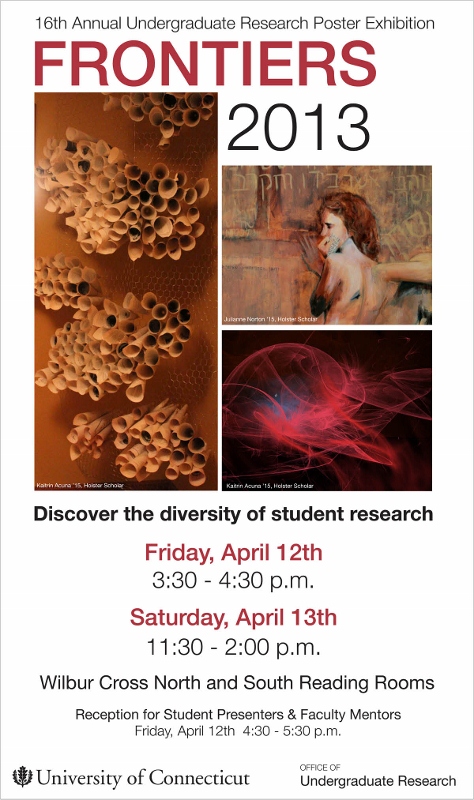The SHARE program supports undergraduate research projects in the social sciences, humanities, and arts. We are pleased to announce the 20 awardees for the Spring 2013 semester. Congratulations!
Project Title: Beyond Nation States
Student Apprentice and Major: Matea Batarilo, Political Science
Faculty Mentor and Department: Prakash Kashwan, Political Science
Project Title: When the Courts Make History: the Impact of the Inter-American Court of Human Rights in Latin America’s Conflict Zones
Student Apprentice and Major: Kattie Bonilla, Political Science and Individualized Major: Latino Immigrant Women to the U.S.
Faculty Mentor and Department: Luis van Isschot, History and Human Rights
Project Title: Altering Health Incentives through Health Independent Systems
Student Apprentice and Major: Shavonda Brandon, Economics
Faculty Mentor and Department: Dennis Heffley, Economics
Project Title: Could a Union Save This Planet? Coding and Analyzing ‘Sustainable Development’: Perspectives of the IUCN Members
Student Apprentice and Major: Carl D’Oleo-Lundgren, Political Science and Individualized Major: International Relations
Faculty Mentor and Department: Prakash Kashwan, Political Science
Project Title: The New Normal: Goodness Judgments of Non-Standard Speech Variants
Student Apprentice and Major: Julia Drouin, Speech Language and Hearing Sciences
Faculty Mentor and Department: Emily Myers, Speech Language and Hearing Sciences
Project Title: A Study of Teachers’ Questioning Sequences in Reading Instruction
Student Apprentice and Major: Rebecca Duchesneau, Secondary Social Studies Education and History
Faculty Mentor and Department: Catherine Little, Education
Project Title: Teacher Questioning and Student Responses: Promoting Higher-Level Thinking
Student Apprentice and Major: Sarah Forte, English Education
Faculty Mentor and Department: Catherine Little, Education
Project Title: Discourse in Linguistically Diverse Mathematics Classrooms
Student Apprentice and Major: Chelsie Giegerich, Elementary Education; English Concentration
Faculty Mentor and Department: Mary Truxaw, Curriculum and Instruction
Project Title: Hunger Amidst Plenty: Social Mobilization on the Right to Food in India
Student Apprentice and Major: Syeda Haider, Political Science
Faculty Mentor and Department: Shareen Hertel, Political Science
Project Title: Latina/Latin American Transnational Narratives of War and Violence
Student Apprentice and Major: Krisela Karaja, Spanish and English
Faculty Mentor and Department: Guillermo Irizarry, Literatures, Cultures, Languages
Project Title: Contemporary Indian Art
Student Apprentice and Major: Julianne Norton, Psychology
Faculty Mentor and Department: Kathryn Myers, Anthropology
Project Title: Divorce and Well Being
Student Apprentice and Major: Hagar Odoom, Human Development and Family Studies and Political Science
Faculty Mentor and Department: Edna Brown, Human Development and Family Studies
Project Title: Gullah Voices: Watch Night
Student Apprentice and Major: Cristobal Ortega, Journalism and Fine Arts: Concentration in Photography
Faculty Mentor and Department: Mary Junda, Music
Project Title: Caribbean Documentation Project
Student Apprentice and Major: Chelsea Pajardo, History and Psychology
Faculty Mentor and Department: Fiona Vernal, History
Project Title: Gullah Voices: Traditions and Transformations
Student Apprentice and Major: Emily Palumbo, Music and Marketing
Faculty Mentor and Department: Robert Stephens, African American Studies
Project Title: Provision of Emotional Support to Increase Pumping Duration in High Risk Mothers
Student Apprentice and Major: Rebecca Paquette, Nursing
Faculty Mentor and Department: Jacqueline McGrath, Nursing
Project Title: Shared Parenting and its Influence on Post-divorce Fathering
Student Apprentice and Major: Shannon Perkins, Human Development and Family Studies
Faculty Mentor and Department: Kari Adamsons, Human Development and Family Studies
Project Title: The Role of Social Setting in the School Adjustment of Youth Attending Ethnic-Racially Diverse Schools: A Multi-Method, Multi-Dimensional Longitudinal Investigation
Student Apprentice and Major: Andrea Salazar, Human Development and Family Studies
Faculty Mentor and Department: Annamaria Csizmadia, Human Development and Family Studies
Project Title: Perceptual Processing in Individuals with Dyslexia
Student Apprentice and Major: Katlyn Salvador, Communication Disorders and Psychology
Faculty Mentor and Department: Rachel Theodore, Speech Language and Hearing Sciences
Project Title: When the Courts Make History: the Impact of the Inter American Court of Human Rights in Latin America’s Conflict Zones
Student Apprentice and Major: Jack Zachary, Political Science and Human Rights
Faculty Mentor and Department: Luis van Isschot, History and Human Rights
